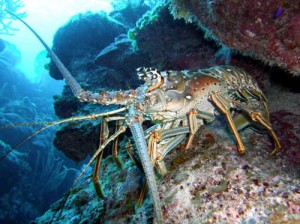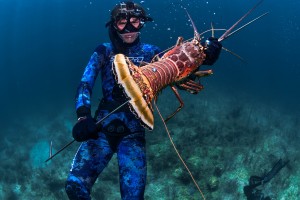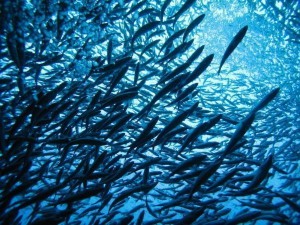
Does Jamaica Protect Or Neglect Our Fishery Resources?
July 2nd, 2017
“The enforcement is not there!” exclaims Havland Honeyghan, Chair of the Jamaica Fishermen’s Cooperative and the Gillings Gully Fishermen’s Cooperative. “The Government needs to put more resources into this,” he adds, “for example, start using the proposed drones to patrol Jamaican waters and spot poachers and lawbreakers.”
“There are too many fishermen catching too few fish.”
While he points to pollution and rampant poaching by Illegal, Unreported and Unregulated (IUU) vessels he also asserts that further afield the offshore fishing banks are threatened. These include the rocky reefs, vulnerable coral reefs and seagrass beds where the Spiny Lobster makes its home.
The Ocean Conference made a big splash in New York from June 5 – 7. Thousands of scientists, policymakers, environmentalists and media descended on the UN headquarters to discuss Our Ocean, Our Future. This is not just a catchy slogan but a mantra to be taken literally. The ocean covers three-quarters of our planet’s surface. It provides food for 4 out of 10 people globally. It protects us from the worst of climate change, as a carbon sink. So if the oceans’ health continues to decline at its current rate, so will ours.
One burning issue at the Conference was sustainable fisheries. In 2013 over 31 per cent of global fish stocks were overfished, according to the Food and Agriculture Organisation (FAO). This is not sustainable, and it should make us all look inward to our own precious fishery sector.
In Jamaica, the main problem, says CEO of the Jamaica Environment Trust Diana McCaulay, is a lack of enforcement. The new Fisheries Bill to replace the outdated Fisheries Act of 1976, was amended in 2015 and only now are efforts being made to “fast track” it through Parliament; kudos to sitting Minister Karl Samuda. Meanwhile, at a lower level and in the belly of the beast, there is a feeling that the Fisheries Division could achieve much more.
Does Jamaica really have a handle on the problem? Once the overdue Fisheries Bill is gazetted, does the Fisheries Division have enforcement policies and infrastructure adequate enough to regulate our approximately 20,000 fisherfolk?
Let’s look at the Caribbean Spiny Lobster (Panulirus argus). Delicious – yes, but overfished. Marine Biologist at the University of the West Indies Dr. Dayne Buddo says he sees spear fishermen with Spiny Lobsters walking down the road – even past policemen – during the closed season! Fines have increased but we need to start enforcing and catching the illegal fishers, first of all.
Out of season harvesting clearly indicates that the Fisheries Division is leaving much to be desired. In addition, destructive and unsustainable fishing methods – from the wrong type of nets to dynamite – and, most detrimentally, from illegal, unreported and unregulated fishing must be addressed. The World Bank estimates that the global fisheries sector loses around US$83 billion every year from overfishing. In Jamaica, as elsewhere, fishing methods require regulation – and importantly, constant monitoring.
Spear fishing which is used to commercially catch Spiny Lobsters (this is banned for the Spiny Lobster and other species in Florida, but not in Jamaica) can be devastating. The International Union for the Conservation of Nature (IUCN) notes: “Unfortunately, poaching and other forms of illegal fishing, plus fishery regulations that are not based on the best science or data, threaten this species, and populations are likely to continue to decline.” There are similar concerns for the Queen Conch (Strombus gigs). Additionally, the Ministry of Agriculture and Fisheries estimates that Jamaica loses many millions of U.S. Dollars annually from the poaching of these two species.
The Caribbean relatively has no large-scale industrial fisheries. Nevertheless, the Wider Caribbean (including the Gulf of Mexico) is one of the most over-fished regions in the world. Catches in the past decade are at least thirty per cent below those of the previous thirty years. They continue to decline. The Caribbean Fisheries Mechanism concedes that “effectively managing” regional fish stocks to conserve marine biodiversity – that vast range of life beneath the waves – is a significant challenge. (Did you know that new marine species are still being discovered?)
The closed season for the Spiny Lobster has just ended, but tighter monitoring is essential both now and throughout the year. Did you know that it is against the law to catch the “berried” lobster (with eggs) and undersized lobsters (under three inches in length, excluding the tail) at any time of year? Did you know also that in overfished areas, according to the IUCN, females are actually producing fewer young? According to the marine conservation organisation Oceana, “A collapse in this fishery would threaten coastal economies in many places.”
The eminent marine biologist Dr. Sylvia Earle, who attended the Ocean Conference at the UN, has the last word:
So should we race to see how quickly we can consume the last tuna, swordfish and grouper? Or race to see what can be done to protect what remains? For now, there is still a choice.
The Gleaner reserves the right not to publish comments that may be deemed libelous, derogatory or indecent.
To respond to The Gleaner please use the feedback form.
- We Are the Zoomers
- Living Online with Humans and Birds: NAOC 2020
- Human Trafficking and the Problem of Public Education
- Down Memory Lane
- Are We Ready to Recover from COVID-19?
- Road Safety Matters: Is Your Vehicle Safe?
- Sexual Harassment, Me Too, and the Minister’s Disturbing Giggle
- The Vulnerable Senior Citizens, Private Care Homes and COVID-19
- A Muddle Over Masks
- Here is Something Life-Saving You Can Do: Give Blood!






